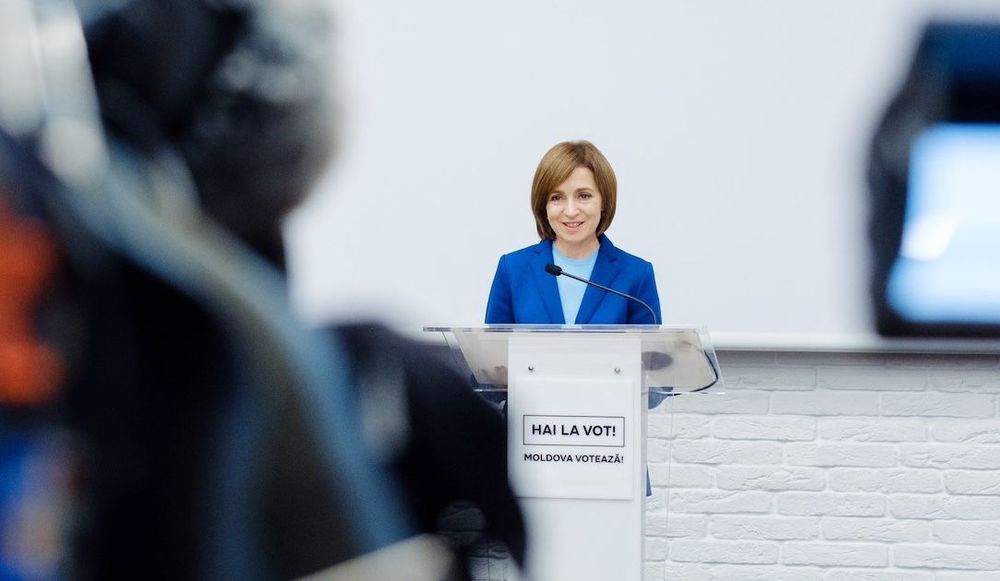Moldova elects pro-West president Maia Sandu despite Russian interference
Maia Sandu, Moldova’s incumbent pro-Western president, has won a second term in office after this weekend’s second-round election, despite attempts by Russia-linked entities to sway the vote against her.
Sandu becomes Moldova’s first president to secure a second term by popular vote since the country’s independence following Soviet Union occupation in 1991, registering 55.41% of the vote with 99.86% of ballots counted as of publication.
Her re-election marks a significant move in Moldovan politics following the country’s referendum to pursue membership of the European Union, which Sandu was a major supporter of.
Ahead of the first round of voting, Moldova’s national intelligence agency warned that it believed Russia was planning to interfere in the vote to “vilify and discredit” pro-European candidates. Over the course of the second round of voting this weekend, Moldova again saw “massive interference by Russia in our electoral process” according to Stanislav Secrieru, a national security adviser to Sandu.
Promo-LEX, an election observation group, said it had recorded more than 100 incidents suggesting interference in the vote — including 25 cases in which ballot boxes were not sealed according to legal procedures. As Secrieru set out on social media, the interference also included organized voter transportation which is illegal under Moldova’s election code.
A video showing what appeared to be a charter flight full of Moldovan passport-holders being shared by the Sputnik media group. The broadcast of the video to a Russian audience aligns with what professor Thomas Rid described as the main target of Russian influence operations — not the audience in the subject country, but their own funders.
According to Secrieru, Moldova’s cybersecurity agency also reported that the voter information site run by the country’s Central Election Commission was temporarily unavailable on the day of the vote due to a DDoS attack.
Other coordinated cyberattacks reportedly targeted the connectivity of Moldova’s national voter record systems and disrupted links between polling stations domestically and abroad.
“These attempts to interfere with our democracy are being urgently addressed. Measures are in place to protect election integrity. It’s going to be a long night for our cyber defenders,” said Secrieru.
Unlike the recent disputed elections in Georgia — where the country’s president, Salome Zourabichivili, has urged people to protest against the “rigged vote” — Moldova permitted its diaspora population, up to 20% of the electorate, to participate in the elections. Pre-ballot polling and the vote itself indicated this group was overwhelmingly supportive of Sandu and of joining the European Union.
There were multiple attempts to disrupt these international votes, including hoax bomb threats in at least two election centers in the United Kingdom and two others in Germany.
Merseyside Police told Recorded Future News that it established a bomb hoax had been made at a hotel in Liverpool where Moldovans were casting their votes, and that the proceedings had been able to continue after only a brief interruption.
Earlier this year, a joint statement from the United States, United Kingdom, and Canada warned that the Kremlin was attempting to interfere in the Moldovan presidential election and referendum.
The statement stressed that the allies had “full confidence in Moldova’s ability to manage these threats linked to the Kremlin’s interference,” and were making the statement “in defense of our shared democratic values.”
On Monday, Sandu wrote: “Yesterday, Moldovans took a crucial step forward on our European path. But the fight for democracy in Moldova — and across our region — continues.”
She added: “To the people of Georgia: I admire your resilience and determination to build a free, European future. Stand strong—Moldova is with you.”
U.S. President Joe Biden called it a "historic reelection" in a statement on Monday.
"For months, Russia sought to undermine Moldova’s democratic institutions and election processes. But Russia failed," Biden said. "The Moldovan people have exercised their democratic right to choose their own future, and they have chosen to pursue a path aligned with Europe and democracies everywhere."
Alexander Martin
is the UK Editor for Recorded Future News. He was previously a technology reporter for Sky News and a fellow at the European Cyber Conflict Research Initiative, now Virtual Routes. He can be reached securely using Signal on: AlexanderMartin.79



